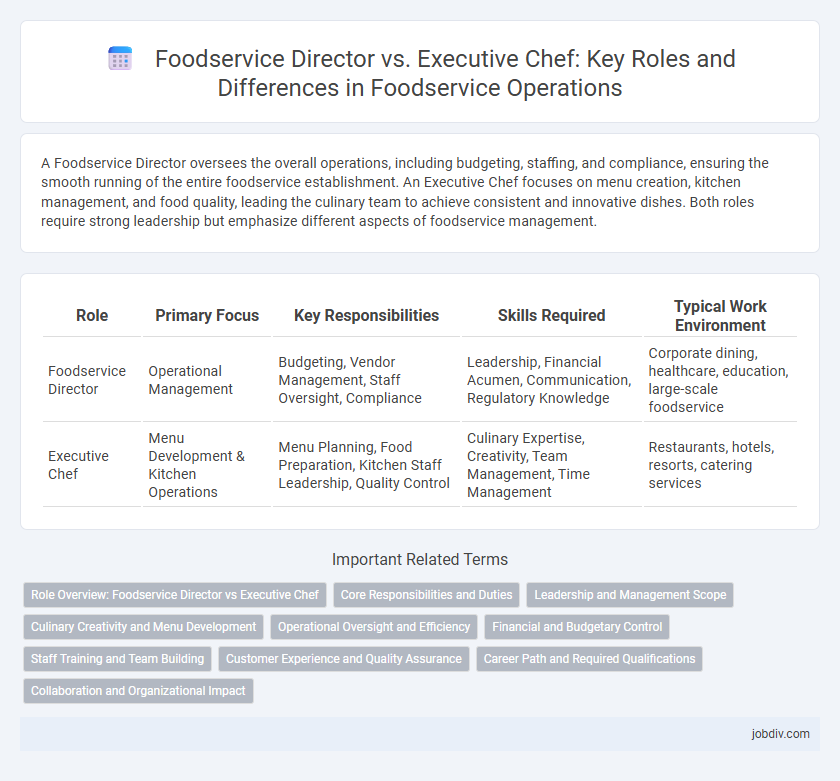A Foodservice Director oversees the overall operations, including budgeting, staffing, and compliance, ensuring the smooth running of the entire foodservice establishment. An Executive Chef focuses on menu creation, kitchen management, and food quality, leading the culinary team to achieve consistent and innovative dishes. Both roles require strong leadership but emphasize different aspects of foodservice management.
Table of Comparison
| Role | Primary Focus | Key Responsibilities | Skills Required | Typical Work Environment |
|---|---|---|---|---|
| Foodservice Director | Operational Management | Budgeting, Vendor Management, Staff Oversight, Compliance | Leadership, Financial Acumen, Communication, Regulatory Knowledge | Corporate dining, healthcare, education, large-scale foodservice |
| Executive Chef | Menu Development & Kitchen Operations | Menu Planning, Food Preparation, Kitchen Staff Leadership, Quality Control | Culinary Expertise, Creativity, Team Management, Time Management | Restaurants, hotels, resorts, catering services |
Role Overview: Foodservice Director vs Executive Chef
The Foodservice Director oversees overall operations, budget management, and strategic planning to ensure efficient foodservice delivery across multiple outlets. The Executive Chef focuses on menu development, kitchen supervision, and culinary quality control to maintain high standards in food preparation. Both roles collaborate closely to align operational goals with culinary excellence, driving the success of the foodservice establishment.
Core Responsibilities and Duties
Foodservice Directors oversee overall operations, budgeting, staff management, and compliance with health regulations, ensuring efficient facility performance and profitability. Executive Chefs focus on menu development, kitchen workflow, food quality control, and culinary staff supervision to deliver optimal dining experiences. Collaboration between both roles is crucial for balancing operational efficiency and culinary excellence in foodservice management.
Leadership and Management Scope
Foodservice Directors oversee the overall operations, financial management, and strategic planning of multiple foodservice outlets or large-scale facilities, ensuring compliance with health regulations and budget targets. Executive Chefs focus primarily on kitchen leadership, menu development, staff training, and maintaining food quality and consistency within a specific establishment. Leadership for Foodservice Directors centers on organizational management and cross-department coordination, while Executive Chefs lead culinary teams and drive kitchen efficiency.
Culinary Creativity and Menu Development
Foodservice Directors focus on strategic culinary creativity by overseeing menu development that aligns with budget, customer preferences, and operational efficiency. Executive Chefs drive hands-on culinary innovation, crafting recipes and refining dishes to elevate quality and presentation. Both roles collaborate to balance creative vision with practical implementation in foodservice operations.
Operational Oversight and Efficiency
The Foodservice Director oversees overall operational efficiency, budget management, and strategic planning to ensure smooth foodservice operations across multiple units. The Executive Chef focuses primarily on kitchen performance, menu development, and food quality control, directly managing culinary staff and food preparation processes. Both roles collaborate to optimize workflow but the Director emphasizes broader organizational goals while the Executive Chef hones in on day-to-day kitchen execution.
Financial and Budgetary Control
Foodservice Directors oversee overall financial management, including budgeting, cost control, and profit maximization across multiple units or departments. Executive Chefs primarily manage kitchen operations, focusing on food cost control, inventory management, and labor efficiency within the culinary team. Effective collaboration between both roles ensures optimal budget adherence and financial performance in foodservice operations.
Staff Training and Team Building
Foodservice Directors oversee staff training by implementing strategic programs that align with operational goals and enhance team performance. Executive Chefs focus on hands-on training in culinary techniques, fostering collaboration and efficiency within kitchen teams. Both roles are essential for building cohesive, high-performing foodservice staff through tailored development and leadership.
Customer Experience and Quality Assurance
Foodservice Directors oversee overall operational management, ensuring consistent customer satisfaction by implementing strategic quality assurance protocols that align with brand standards. Executive Chefs focus on culinary innovation and hands-on kitchen leadership, directly influencing food quality and presentation to enhance the customer dining experience. Both roles collaborate closely to maintain high service standards and elevate guest satisfaction through effective quality control and menu excellence.
Career Path and Required Qualifications
Foodservice Directors typically require a background in hospitality management or business administration, often holding a bachelor's degree and several years of supervisory experience in foodservice operations. Executive Chefs usually progress through culinary school and extensive kitchen experience, emphasizing culinary expertise, menu development, and staff leadership. Career paths diverge as Foodservice Directors focus on strategic planning, budgeting, and overall facility management, while Executive Chefs concentrate on food quality, kitchen workflow, and culinary innovation.
Collaboration and Organizational Impact
Foodservice Directors and Executive Chefs collaborate closely to streamline kitchen operations and enhance overall customer satisfaction by aligning menu innovation with operational efficiency. The Foodservice Director oversees budget management, vendor relations, and strategic planning, while the Executive Chef focuses on culinary creativity, kitchen staff training, and quality control. Their partnership drives organizational success by balancing financial goals with exceptional food quality, directly impacting profitability and brand reputation.
Foodservice Director vs Executive Chef Infographic

 jobdiv.com
jobdiv.com